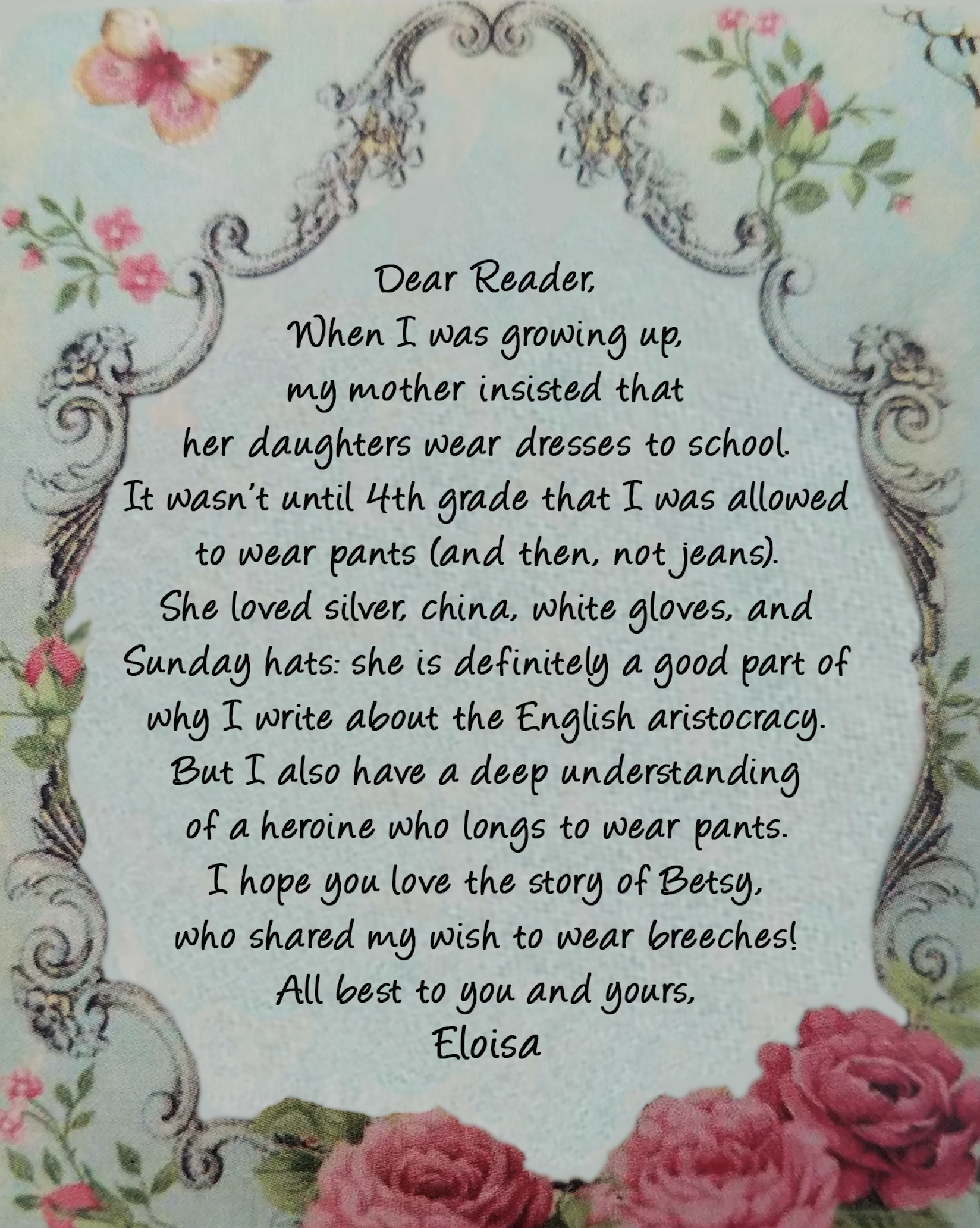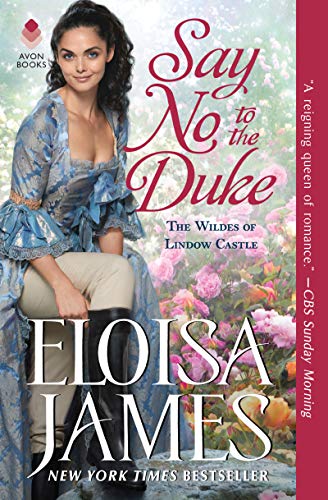Join Eloisa from her cozy apartment as she reads from Say No to the Duke.
Bookcode: say-no
Deleted Scenes for Say No to the Duke
Generally, one introduces characters by describing their eyes or their occupation… I decided to introduce you to two of my favorite characters — Jeremy and Betsy — by sharing two deeply emotional scenes that I had to cut or modify when finishing Say No to the Duke. So you’re the only ones who get to see these scenes! They show what makes Betsy and Jeremy such fascinating, powerful, conflicted people, and that, of course, means that the end of Say No is all the more romantic! I hope you enjoy ~Eloisa
In which two people realize their happiness is in another’s hands.
~Jeremy~
Jeremy sat down on his bed and scrubbed his hands over his face, and though fleetingly about whiskey. But it never had worked, and it never would.
In the end, he was the only one in this room, the way he’d been the only one on the battlefield. The idea of Betsy as a duchess made him feel wild and little mad, like a tiger let out of its cage.
But she wasn’t his. He felt as if she was his. Somehow, he’d decided that the girl who leaned over the billiards table, who coaxed him into smiles and scoffed at him…
Was his.
She wasn’t. He could see now that she hadn’t been her own, either. That Betsy who marauded the ballroom floors, charming men into offering their hands and then oh so kindly, rejecting them…
That wasn’t her either.
She might find herself, and decide to come to him. Or she wouldn’t.
He couldn’t entertain that feeling peacefully. He discovered he was baring his teeth at the thought. But even the shock of that emotion was something new. It wasn’t guilt.
Emotion was good.
His man came in, followed by footmen with pails of water. Jeremy bathed, and dressed in fresh clothes brought from Lindow—because even though Lady Knowe decreed it was too snowy to return home, apparently grooms had been galloping back and forth all day—and kept his silence.
He knew what a day like this felt like. The morning of that battle, for instance. When he argued with his commander and tried to change the orders. Except orders couldn’t be changed. He’d done his best, though.
His best hadn’t been good enough, but it was all he had.
There was something peaceful in that idea.
And now, again, what happened next wasn’t in his hands. He’d made his plea, set down his idea.
And it was up to Betsy. A queer thought came to him: his commander had been too afraid to go against orders, even when he knew they were mistaken. That’s why he hung back; that’s why he took his battalion and fled before he and his men were massacred.
It wasn’t all that different now. Betsy would have to go against the way life was structured in order to choose him. Everyone wanted to be a duchess. Hell, a duke’s daughter ought to marry a future duke.
She might be as good as court-marshalled for choosing him, a man whom half of English thought had hidden behind a tree and saved his own skin. That took courage, especially from a young woman whose mother was infamous for her scandalous choices.
There would be no hiding, either. If she married him, everyone in England would understand that she followed her own inclination, because no father in the world would choose him over a future duke. And not just any duke: Thaddeus, the perfect gentleman.
Noble and kind enough to suppose him, for example.
~Betsy~
“I gather that you think you’re fated to become a slut,” Jeremy said, “because your mother had the temerity to fall in love with a Prussian.”
Betsy pulled her hand back, narrowing her eyes. “It sounds stupid when you put it that way, but people inherit traits from their parents. Just as horses do.”
“Traits, perhaps. But immorality? Not so much. You can ask my father; he will tell you quite flatly that my crimes on the battlefield are the result of cowardice such as has never been seen in my family tree.”
“You were not a coward in battle!” Betsy hissed.
He shrugged. “Someone informed my father that I was, and he didn’t care to inquire of me as to the truth.”
“That’s just wrong,” she said fiercely. “Someone has to inform him of his mistake.”
He saw determination in her face and shook his head. “That’s between my father and myself, warrior though you are.”
“We are both warriors,” she said. And sighed. “I fight against the propensities that I inherited from my mother, and frankly, our very circumstances here suggest that I am right to do so.”
“Because I am kissing you?”
“Because I want to kiss you and we are not married. I do not wish to kiss Thaddeus.”
“Good reason not to marry him,” Jeremy pointed out. Then he read hesitation in her eyes. “Bloody hell,” he said. “You don’t get it, do you?”
“I think I have a good grasp of the possibilities,” Betsy said indignantly.
“Would your stepmother sleep with another man?”
Betsy shook her head. “Never.”
“The duchess, the third duchess loves the duke,” Jeremy said, rolling over on his back. “She adores him. She’s infatuated, enthralled, enraptured.”
“I suppose so.” She didn’t care to think about a woman being “enthralled” by her father.
“She loves him and therefore she won’t run away with a yellow-haired Prussian, or a black-haired Prussian, for that matter.”
“No, she won’t,” Betsy said firmly. It was painful, but she had to say it. “My mother’s character was not as virtuous as Ophelia’s, I’m afraid.”
“You’re missing the point,” Jeremy said. “She didn’t love your father, and Ophelia does. That is the true crime,” he added reflectively. “The elder Wilde, adored by all his children and, from what I hear, by the country at large, was unloved by one of his three wives. The fact that two of them adored him—thereby making him luckier than the majority of Englishmen—is unimportant.”
“The true crime, if it rises to the level of that word,” Betsy said sharply, “is that my mother deserted her husband, yes. For a yellow-haired Prussian. But she also left four babies, one of whom was a few weeks old.”
When he spoke his voice was gentler, “So the crime is lack of motherly love. You, her eldest daughter…she had the time with you. And how could she not love you?” He reached out and slid his hand down her arm and closed his large hand around hers. “She was out of her mind.”
“From what Aunt Knowe tells us, she didn’t come to know any of us,” Betsy said and even to her own ears, her voice was sad. “But you don’t miss what you don’t know, and we all had Aunt Knowe. I was quite happy until I reached school and discovered that my mother’s reputation preceded me.”
“How so?”
“I’d rather not speak about it.”
“You must.” He had that severe judge-like look again. “It’s all very well, twittering around society like a demented virgin, but if you don’t tell the truth of it, it will eat you up.”
“The way your guilt has eaten you up?”
“Exactly.” He said it easily, without pause.
Enjoy another deleted scene, but from another author’s work! Julia Quinn posted a deleted scene from The Other Miss Bridgerton on the very same day I posted this. I hope you enjoy! ~Eloisa
The Wilde Family Tree
There are a lot of family members in the Wilde family and readers have said it can be a challenge to keep them all straight. Here is a handy guide to who’s who, how they are related, and where they fall in birth order.
*Please note: Some of the names are linked to Wikipedia pages. Since each of the Duke’s children is named for a historical warrior, real or literary, readers can look up the inspiration for the namesake. (Eloisa cannot vouch for the accuracy of the full content of each of these pages, but it definitely serves for reference.)

The WILDES
Hugo Wilde, the duke (1721- ). His Grace has a twin sister and has been married three times. Once widowed, once divorced, now happily married.
Lady Knowe, the duke’s twin sister (1721- ). She is also known as “Lady Know.”
Hugo’s first duchess: Marie (1721-1757) m. 1747
Hugo & Marie’s children:
Horatius (1748-1773)
Roland, “North” (1750- )
featured in: Too Wilde to Wed
Alaric (1751- )
featured in: Wilde in Love
Parth, foster son (1750- )
featured in: Born to be Wilde

Hugo’s second duchess: Yvette m. 1759; div. 1766
Hugo & Yvette’s children:
Leonides (1760- )
Boudicea, “Betsy” (1762- )
featured in: Say No to the Duke
Alexander (1763- )
Joan (1764- )
featured in: Wilde Child

Hugo’s third duchess: Ophelia m.1766
featured in: My Last Duchess
Hugo & Ophelia’s children:
Spartacus (1768- )
Erik (1772- )
Artemia, “Artie” (1778- )
Ophelia’s child by her first husband Peter (1721-1764), m. 1759
Viola (1764- )
featured in: Say Yes to the Duke

The Books
My Last Duchess – Hugo & Ophelia m. 1766 [A Wilde series prequel, previously titled Wilde Denial. This was a serialized novella available exclusively to Eloisa’s newsletter subscribers that is now a stand-alone book.]
Wilde in Love – Alaric & Willa m. 1778
Too Wilde to Wed – North & Diana m. 1780
Born to be Wilde – Parth & Lavinia m. 1780
Say No to the Duke – Betsy & Jeremy m. 1781
Say Yes to the Duke – Viola & Lucas, m 1782
Wilde Child – Joan & Thaddeus, m 1783
Inside Say No to the Duke
I grew up in a farmhouse in Minnesota—but my mother had grown up in a far grander manner. She brought up myself and my siblings with silver and china at every meal. My brothers changed into white shirts for dinner; my sister and I only wore dresses to school, because we were ladies, and ladies wore dresses. It wasn’t until 4th grade that I was able to wear a pair of cords (not jeans!) to school. She taught me so much—and made it possible to write about the English aristocracy—but she also taught me to treasure pants, a longing that I gave to my cross-dressing heroine, Betsy.
Betsy is the eldest of the Duke of Lindow’s three daughters, which to an outsider makes it seem as if her life must be perfect. But, of course, it isn’t, given that her mother ran away when she was a baby and her parents divorced—an enormous scandal at the time. Bullying at school can affect someone throughout their life. Part of Betsy’s journey is finding a way to free herself of the negative repercussions of her boarding school and learn to forgive her mother, albeit from afar.
I took the descriptions of Jeremy’s PTSD from classical authors; unfortunately, the condition has existed as long as people have been going to war. I faced a challenge in trying to make it clear that falling in love is no cure for PTSD. Yet from everything I learned about it, the support of loved ones is crucial in recovery. Aunt Knowe, with her herbal antidepressants, and Betsy, with her witty repartee and billiards games, give Jeremy the peace he needs to recover.
I am not a fan of novels in which numerous characters from earlier in the series have walk-on roles, mostly because I can’t remember who was who after reading the previous books. For Say No to the Duke I cleared most of Lindow Castle, sending most of the Wildes off to Scotland and even farther afield. If you missing seeing the clan in action, don’t worry! Quite a few of them return to London in time for Viola’s debut!



